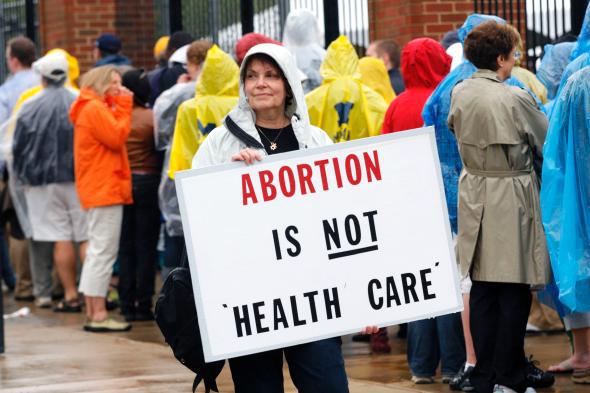For years, pro-choice advocates have been playing a game of whack-a-mole with anti-abortion legislation popping up in states with GOP-controlled legislatures, from TRAP laws to 20-week abortion bans to the dissemination of anti-choice propaganda. Combined with the Supreme Court’s unwillingness to tackle the abortion issue, women have vastly varying abortion access from state to state.
New legislation introduced in Congress this week signals a pushback from Democrats. Representatives Barbara Lee (D-Calif.), Jan Schakowsky (D-Ill.), and Diana DeGette (D-Colo.) have introduced the Equal Access to Abortion Coverage in Health Insurance Act, or the EACH Woman Act. According to RH Reality Check, the EACH Woman Act “would ensure that anyone who has health care or health insurance through the federal government also has coverage of abortion care.” While the bill has 70 co-sponsors, it’s unlikely to pass in a Republican-controlled House.
The bill would prohibit states from restricting insurance coverage of abortion, which is currently allowed by the Affordable Care Act. Significantly, 25 states currently have laws in place that do not allow private insurers to cover abortion.
This legislation is a direct challenge to the Hyde amendment, which Congress passed in 1976, only three years after Roe v. Wade. Although the amendment has changed slightly over the years, the ACLU reports, the “federal Medicaid program mandates abortion funding [only] in cases of rape or incest, as well as when a pregnant woman’s life is endangered by a physical disorder, illness, or injury.”
Rep. Henry Hyde originally said of the bill, “I would certainly like to prevent, if I could legally, anybody having an abortion: a rich woman, a middle-class woman, or a poor woman.”
But his legislation has disproportionately affected lower-income women and women of color. As the report by the Center for American Progress explains, “women of color are more likely to rely on government health programs,” while the Guttmacher Institute found that “approximately one-fourth of women who would have Medicaid-funded abortions instead give birth when this funding is unavailable.”
In 1980, the Supreme Court heard a challenge to the amendment in Harris v. McRae but ultimately upheld it. Justice Thurgood Marshall wrote in his dissent that it was “designed to deprive poor and minority women of the constitutional right to choose abortion. That purpose is not constitutionally permitted under Roe v. Wade.”
RH Reality Check itemizes the would-be impact of the bill. It “would affect millions of women who receive health coverage through the federal government, including the one in six women who are enrolled in Medicaid; about one million female federal employees; women in the military or in the Peace Corps; young women under age 19 who are insured through the Children’s Health Insurance Program (CHIP); Native American women covered under Indian Health Services; and women covered under these programs through a spouse or a parent.”
Since the Supreme Court found the amendment constitutional in 1980, and President Obama’s executive order in 2010 brought the ACA in line with the current federal funding policy on abortion, the bill doesn’t have much of a chance. But feminist organizations are rallying around the most recent effort by Reps. Lee, Schakowsky, and DeGette to make abortion access more than a random game of appearing and disappearing rights.
